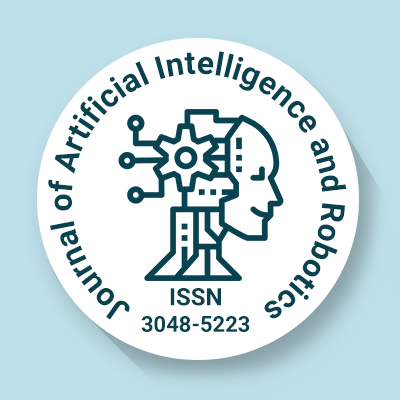
Journal of Artificial Intelligence and Robotics
OPEN ACCESS
ISSN: 3048-5223

OPEN ACCESS
ISSN: 3048-5223
Artificial Intelligence (AI) is developing industries, creating innovation, and restructuring our living style and work. From machine learning and neural networks to natural language processing and robotics, AI continues to cross technological boundaries, unlocking extraordinary potential. Researchers and industrialists are discovering its applications across various fields such as health sectors, finance, business, robotics, etc. As AI develops, proper reflections and the future of human-AI association is a topic of discussion.
The fast progress of AI is powered by improvements in deep learning, reinforcement learning, and generative AI. Large language models, such as Chat-GPT, have better natural language understanding, allowing AI to create humanized text, help in creative writing, and facilitate real-time language translation. AI-driven chatbots and virtual assistants enhance customer interactions by providing instant, personalized responses. Similarly, AI-powered recommendation systems have transformed digital experiences, curating content for users in entertainment, e-commerce, and social media.
One of the most important uses of AI is in healthcare, where it is developing therapy, disease diagnosis, and medical research. AI algorithms scan vast amounts of data to detect trends in medical images, enabling early detection of patients with cancer, cardiovascular diseases, and Alzheimer’s. In complicated operations, robotic surgery provides precision and minimizes risks.
In the banking sector, AI helps in monitoring risk factors, fraud detection, and investment options. Predictive analyses of AI allow banks to identify bugs in transactions and prevent fraudulent transaction as well as improve security. Robo-advisors utilize AI to identify market trends and offer customized investment advice. Computerization of repetitive tasks like documentation and compliance checks helps enhance operating efficiency and lower costs.
AI equally contributes in the field of automation, revolutionizing industries like logistics, manufacturing, and transport. Self-driving vehicles are growing at a rapid pace and they are very flexible and efficient. There are several uses for drones, including investigation, agricultural areas, disaster prediction, and crop monitoring. Rescue operations and infrastructure inspection.
AI is characterized by great ability. It presents societal and ethical challenges that need to be addressed. Threats by algorithmic bias, job displacement, and data privacy underscore the importance of transparent and explainable AI systems. Ethical guidelines and policies are being developed by policymakers and researchers to ensure fairness, accountability, and responsible use of AI. Providing inclusiveness and fostering trust in AI system will be essential leads to their successful adoption in society.
AI has contributions in education, conservation and scientific research. AI learning platforms provide personalized learning experiences, adapting to the requirements of students and facilitating interaction. AI helps in analyzing climate data, saving energy, and detecting deforestation through satellite imagery in sustainability. AI is also being employed by scientists for groundbreaking discoveries in genetics, astrophysics and material science, accelerating research and innovation.
As technology grows, AI’s influence on society will only accelerate. While there are challenges, the rewards provided by AI are far greater than the dangers. By ensuring responsible AI innovation, we can harness its revolutionary power to enhance decision-making, optimize efficiency, and accelerate human progress. AI is not only shaping the future AI keeps developing, its impact on society will keep growing. Though there are difficulties, the benefits given by AI far exceed the risks. By promoting responsible AI development, we can leverage its transformative potential to improve decision-making, maximize efficiency, and drive human advancement.